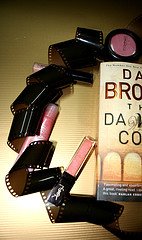
When I first woke up on September 11, 2001, I turned on the news and the fire and smoke pluming from the towers had my lapsed Catholic mind, still half-asleep, just for a moment latching onto imagery from Revelations. And, judging by the response of the religious right to the event, I obviously wasn’t alone. Now terrorism and jihad have become prime movers of the Apocalypse in Western minds. And it’s that willingness to believe in pure evil and the possible end of all things has led to war, and to war again.
But the conservative mindset isn’t the only one filled with dancing visions of Armageddon. In the August issue of
Harper’s, the cover story entitled “A World Without Oil: Scenes From A Liberal Apocalypse” looks at the mostly liberal-led
Peak Oil movement and the concern that eventually oil is going to run out and we may well have to literally head for the hills and learn to live off the land again. (Christ will probably be riding down on a chariot, it appears, because there will be no oil and gas left for the divine Hummer.) Many people (as peace and conflict studies expert Metta Spencer points out in her
blog) are giving up the leftist cause and simply abandoning civilization in fear of what is coming. All they see is long lines of unmoving cars and a crescendo of helpless beeping. And add to this the list of people who have just seen
An Inconvenient Truth and are heading for higher ground.
Things couldn’t possibly be any worse, right? Well, I used to have frequent dreams of nuclear war and trying to survive in the aftermath. Thank you, Mr. Cold War. For decades, the tensions between the bipolar powers were further strained by movies like
Fail-Safe and countless spy thrillers and Godzilla movies playing on our fears of nuclear disaster. On top of this, Rachel Carson’s 1962 book,
Silent Spring, had launched an environmentalist movement that insisted we were destroying the world right from under our own feet - not to mention numerous studies that plotted the booming population of the planet to equator-busting limits by the time the new century arrived. (See
Soylent Green or even
Logan’s Run if you want some indication of where those fears could lead people.)
When the Berlin Wall fell in 1989 I thought that at least some of the tension would dissipate, but all of a sudden violent crime surged everywhere – at least on the news. Even while the numbers for violent crime were falling, the fear of it was rising. Could it be that people so strongly needed something to fear, some death wish to hold close like a burning teddy bear, they had to manufacture something out there in the night waiting for them? (Oh, and fear of crime is only going to get worse for an increasingly physically vulnerable North American population. There will be fewer young people to commit actual crimes, but more senior citizens paranoid about young people committing crimes.)
When you read far enough back in history, the Apocalypse and its champions have come and gone far too many times to count. Fated dates have whistled by with nary a cleansing flame. Paths of bloody glory have gone unswathed. Maybe that’s why when I was working on my
book of poems about the many possible ways the world would end the tone of those poems grew more satirical with each new piece. The book
I had begun in fear was turning into something that was increasingly funny. I had started to realize that the Apocalypse was just a genre – a genre of thought I could play with and deconstruct.
I realized that people often projected their own insecurities onto the world and the Apocalypse takes the shape of what we as individuals fear or, in some cases, desire. The open-minded and tolerant left, for example, really only fears death. That’s why the left have been so outspoken about eating right, exercising, getting all the toxins out of their systems. And so go their attitudes for the environment. “We mustn’t let the planet die,” they assert with a conviction equal to their own need to eat right and take care of their bodies. The right, judgmental as they often are, imagine a Judgment Day when accounts will be balanced, moral deficits made right and winners and losers chosen at last. It will be the capitalist God & Son come for the last stage of a long-planned hostile takeover.
Me, I mostly like shows like
Buffy the Vampire Slayer and
Angel where the Apocalypse can happen in any given episode and represents personal moral choices that people make every day. In
Buffy the choices are about establishing independence and still keeping your friends close. In
Angel it’s about working well with others as an adult and not letting the corporate mentality overwhelm your sense of right and wrong. If you screw up as a person, you let your personal demons win. You are the grounds of Armageddon. You are where the battle is won and lost with every decision you make. This I can understand.
Of course the real end is coming, but it’s unlikely any human will be alive to see it. The planet will most likely die long after humans have passed on. Humans will most likely fade as a species when more tenacious species emerge. Or maybe it will be some very non-Terminator-like robots. Who knows? All I can do right now is be close to those I care about, write down a few things I’ve learned, and relax in spite of all the world-smashing worries people choose to indulge. For now, I live by Buffy’s words: “If the Apocalypse comes, beep me.”






